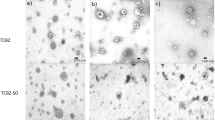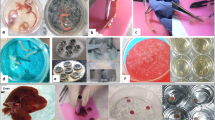Abstract
No systematic attempts at culturing this liver fluke in vitro have yet been made. The survival times in published accounts are very short, and physiological work on such short-lived organisms is highly suspect. Ordinary Ringer solutions were used, and the flukes lived from 5 to 12 hr.1,2,3,4.
This is a preview of subscription content, access via your institution
Access options
Subscribe to this journal
Receive 51 print issues and online access
$199.00 per year
only $3.90 per issue
Buy this article
- Purchase on Springer Link
- Instant access to full article PDF
Prices may be subject to local taxes which are calculated during checkout
Similar content being viewed by others
References
Müller, Zool. Anz., 57, 273 (1923).
Weinland and von Brand, Z. vergl. Physiol., 4, 212 (1926).
Flury and Léeb, Klin. Woch., 5, 2054 (1926).
Harnish, Z. vergl. Physiol., 17, 365 (1932).
Chu, Chin. Med. J., 54, 409 (1938).
Author information
Authors and Affiliations
Rights and permissions
About this article
Cite this article
STEPHENSON, W. Survival of Fasciola hepatica L. in vitro. Nature 155, 240–241 (1945). https://doi.org/10.1038/155240b0
Issue Date:
DOI: https://doi.org/10.1038/155240b0
Comments
By submitting a comment you agree to abide by our Terms and Community Guidelines. If you find something abusive or that does not comply with our terms or guidelines please flag it as inappropriate.



